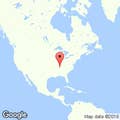BURNS, Tennessee — Jared Taylor used to hold his conference in hotels, but now he has to depend on the government for space — because privately owned hotels can, and have, prevented his group from meeting.
Now, each year, the white nationalist leader hosts his American Renaissance conference here inside Montgomery Bell State Park, a secluded space where, on Friday night, about 300 white nationalist activists gathered. Happy hour started right after Taylor's opening remarks on Friday evening.
I introduced myself to Taylor as he tried to adjust the fluorescent lights in the beige conference room that would play host to the weekend’s lectures. He had invited me to cover the conference and when I approached, he invited me to sit at a table near the front so we could talk.
We were unable to get a word in edgewise as soon as we sat down. First, a tall college-age man approached Taylor and asked shyly if he would autograph one of his books. Taylor did. He asked Taylor if he would translate into Japanese the "14 Words," a white supremacist slogan that is a cornerstone of the movement. (Taylor grew up partly in Japan, the son of missionary parents.) Taylor demurred.
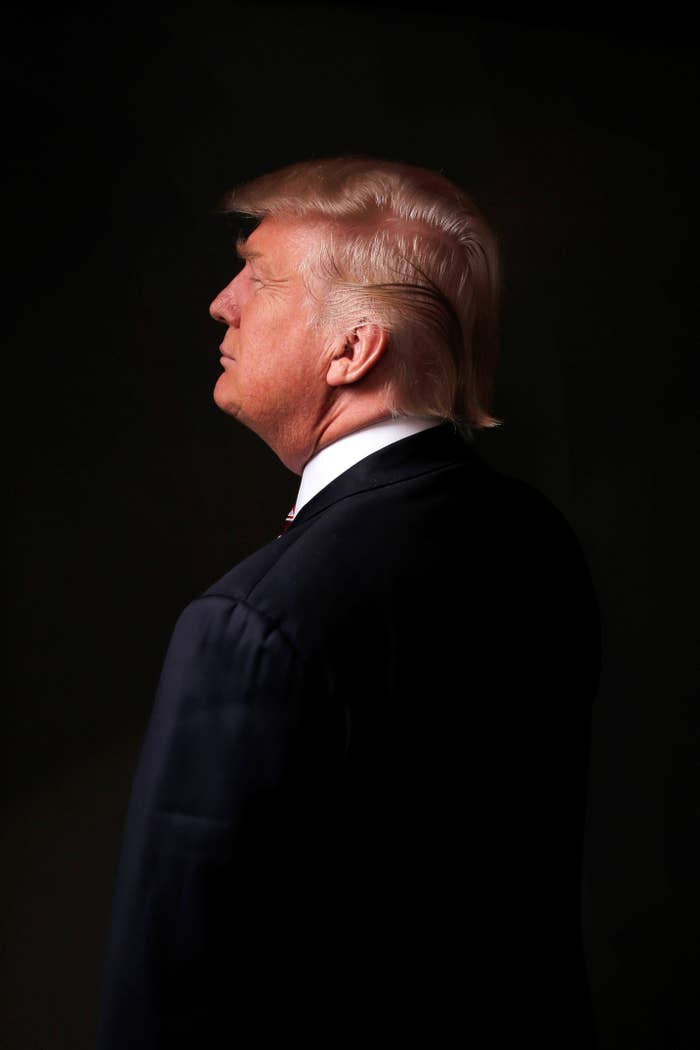
A second man came up, bearing a gift for Taylor: a round ceramic plate, about the size of a saucer, with markings on it. He made Taylor guess what it was. Part of a pulley system, maybe? No, the gift was a tribal Ethiopian lip plate, which the man had picked up on his travels. Taylor, who has written that Africa is an “utterly alien Africa of road-side corpses, cruelty, and anarchy,” accepted it with enthusiasm.
Most years, the American Renaissance conference is an obscure event in an obscure park, attended by a handful of the same fringe figures and elsewise only sparking the attention of the Southern Poverty Law Center.
That was before Donald Trump.
“I would like to invite you to cover an event in Tennessee next month that will help explain part of the voter enthusiasm for Donald Trump,” Taylor had opened his email to me. “I know you have been following his campaign, with a particular interest in the so-called ‘extremists’ who support him.”
This year, white nationalists can barely contain their excitement over the presumptive Republican nominee, and the AmRen conference reflected the moment. “Even if Trump loses, he’s already shown that immigration and economic nationalism and the whole concept of ‘America first’ works electorally,” Peter Brimelow, the founder of Vdare.com, said in his speech to the conference. “There are some elections where losing candidates blaze a trail for the future.” Brimelow asked how many in the audience had been to a Trump rally; about a quarter raised their hands, mostly young people.
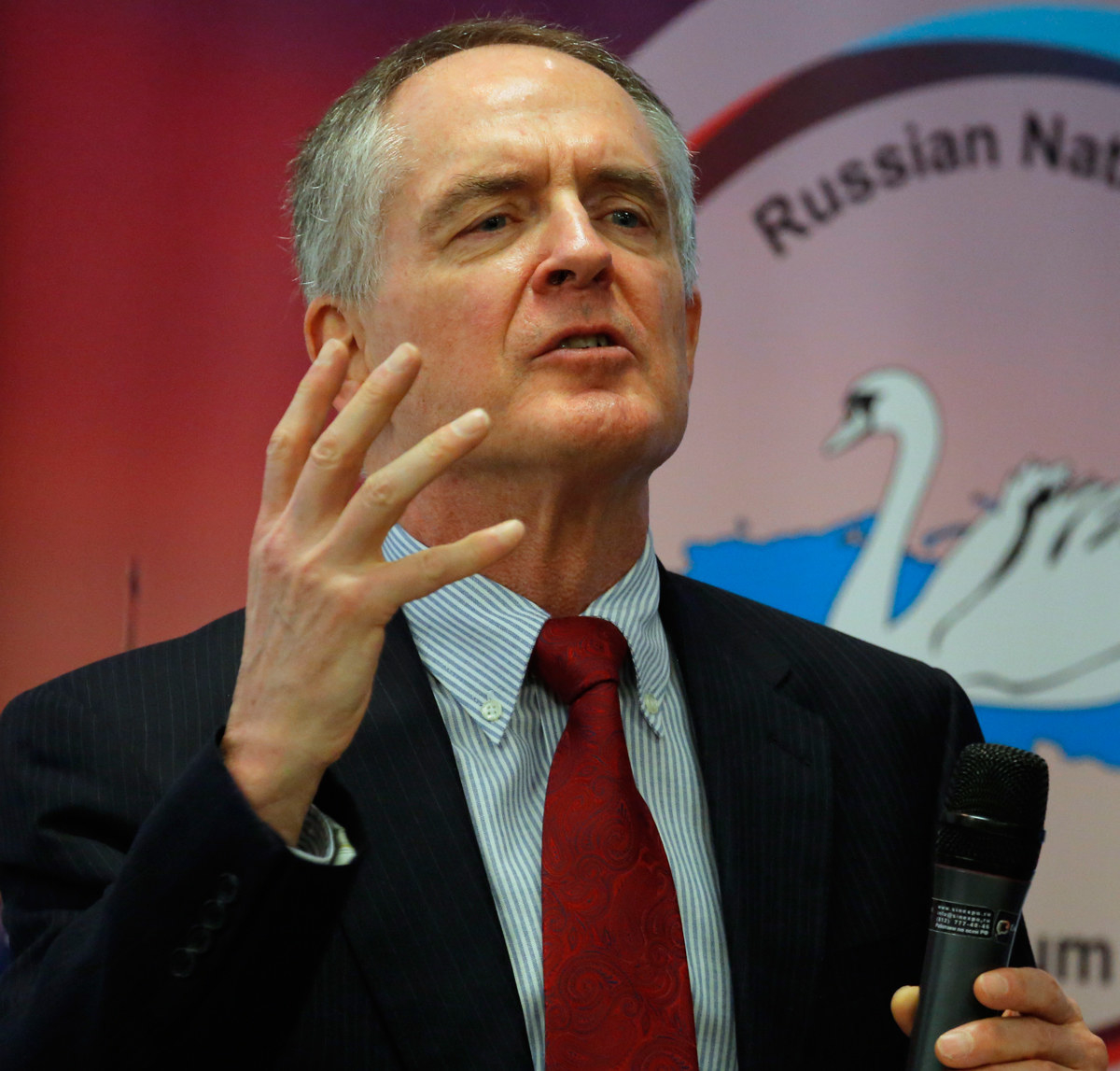
Taylor and others like him represent at this point the old guard of the more think-tanky side of white nationalism. Their movement has started to meld with the younger generation of white nationalists, who by and large consider themselves these days to be alt-right, a mostly online movement I wrote about in December. The alt-right, with its roots in internet ideologies like the Dark Enlightenment combined with good old-fashioned white nationalism, had taken off. “2015 has been huge,” Richard Spencer, the National Policy Institute chair and another luminary in the quasi-intellectual wing of the white nationalist movement, told me at the time.
Months later, their preferred candidate has locked up the Republican nomination without backing down (yet) on the hard-right immigration stances that attracted them to him in the first place, and their feeling of vindication is stronger than ever. There remains an ingrained defensiveness; many people at the conference were using a “nom de guerre,” and reporters were asked to sign a document promising not to take photos of people without their permission, as a condition for entry.
Still, the young alt-righters are reveling in the moment. Many were meeting in person for the first time, and there was a celebratory vibe, particularly on Saturday night for the conference’s banquet. The alt-right guys largely have the same look: a “fashy” haircut, cropped on the sides and longer on top, à la Macklemore. Spencer sports one and seems to have started the trend. One young alt-righter, Karl (not his real name), a twentysomething Texas man active in the Twitter community, seemed like a nice enough guy, friendly and polite. He said his favorite people to troll were Republican strategist Rick Wilson — a frequent target of alt-right trolls — and Weekly Standard editor Bill Kristol. (When I later found what I’m pretty sure is his Twitter account, I found a wall of hatred directed toward “faggots” and Jews.)
"We’re on the winning side for the first time in my experience."
Karl said that while the alt-right has mostly been going after conservatives online, there may be a shift to targeting liberals as the process continues. The alt-right still loves to target “cuckservatives,” but there’s a sense of having won the battle on the right; their candidate has the nomination and is turning his firepower on Hillary Clinton.
It’s impossible to say, though, whether white nationalists have formed a significant portion of Trump’s support. And while this crowd are largely pro-Trump ("Make America Great Again" hats were in evidence), it’s unclear to what extent Trump is aware of them. Spencer, for one, believes he is.
“There are really concentric circles in our movement,” Spencer said. “There’s a hard core of people who are coming to this conference. There’s a wider layer of people who are following us regularly, listening to our podcast, reading everything. There’s another layer beyond that that are reading tweets that are being influenced by mainstream media reports.” Spencer estimated the “hard core” at thousands, maybe tens of thousands of people — but estimated that this hard core was influencing hundreds of thousands, even millions of people.
“We’re on the winning side for the first time in my experience,” Spencer said. “I’m so used to being an avant-garde bohemian intellectual where I have no connection with politics, politicians are ignorant of our ideas or opposed to them.”
“I think Donald Trump unquestionably is aware of us,” Spencer said. “He’s on Twitter, he’s definitely aware of us.”
The Trump campaign did not return a request for comment.
In his opening talk, he had asked the audience how many were attending for the first time; many raised their hands.
Trump has been held to account somewhat for his white supremacist supporters; on CNN a few months ago he was asked about the endorsement of former Ku Klux Klan Grand Wizard David Duke and declined to disavow him. (He later did.) But the stories keep popping up again and again; one of the most recent examples is William Johnson, a California lawyer and American Freedom Party leader who was selected as a delegate for Trump in California and later was removed/resigned from Trump’s slate amid an uproar.
This past weekend Johnson was at the conference, which he has regularly attended over the years.
“I was naive,” Johnson said. “I thought, Gee, I could participate in the electoral process just like everybody else. I thought I could participate and be productive and be a good example for the community and help promote my candidate, but that was not the case.”
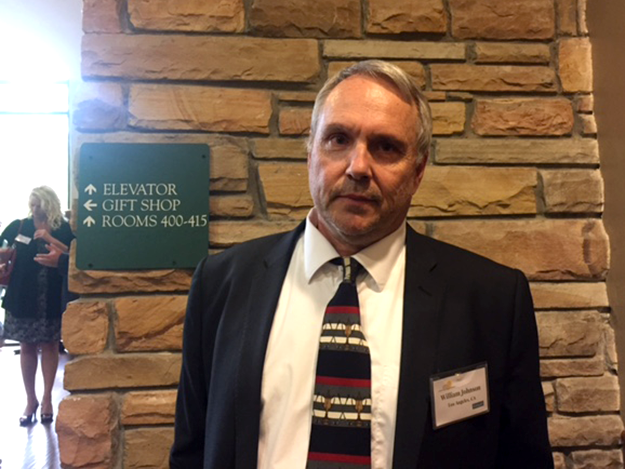
Johnson said the experience hadn’t affected his enthusiasm for Trump, and said he expected more white nationalists to get involved in Republican politics.
“I do see them becoming involved in Republican politics because the Republican Party is now Trump’s party,” Johnson said.
In an interview, Taylor attributed the moment to both Trump and what he called the excesses of the left. Trump, Taylor said, “just has certain instincts, and some of his instincts are entirely healthy.” He is the first candidate in a while to “say anything at all that resonates with a white advocate.”
Taylor said attendance was high this year, “the kind of turnout we’ve had when we used to meet in more convenient places.” In his opening talk, he had asked the audience how many were attending for the first time; many raised their hands.
It was then that Taylor warned his audience that there were friendly and unfriendly journalists in attendance. He told attendees that the unfriendly media would try to portray the conference as hateful and ignorant, and that their job was to prevent us from being able to do that.
Be nice, Taylor basically told his audience, because they’re watching.
His conference’s final presentation on Saturday — a brisk PowerPoint on the history of the alt-right — was given by Paul Ramsey, a fiftysomething Oklahoman who makes YouTube videos popular among this set and who goes by RamzPaul.
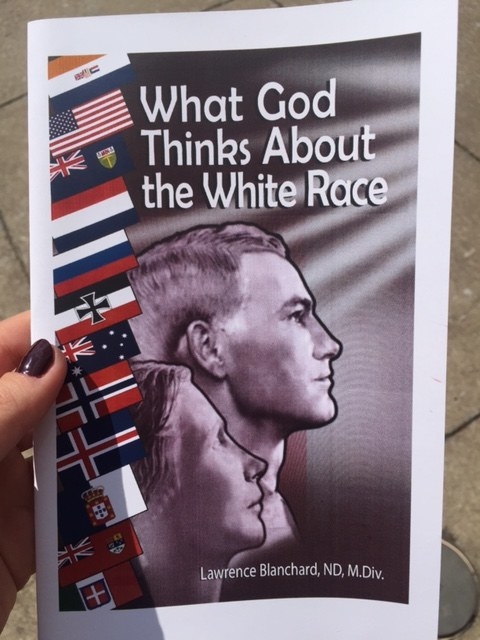
Ramsey mentioned me several times by name. He put onscreen an article about Rush Limbaugh inadvertently praising the alt-right; he attributed it to me and to BuzzFeed News. (The Daily Beast’s Betsy Woodruff wrote the piece, and her picture and byline were shown onscreen.) He showed my December piece on the alt-right. He pointed me out and encouraged the audience to give me a round of applause for publicizing the movement.
The whole sequence reminded me of Trump’s coy routine toward his targets (“I won’t say who it was — OK, it was so-and-so”).
After Ramsey finished, the group began to file out, most headed for a nearby afterparty at a bungalow in the woods. A skinny young guy in an ill-fitting suit with close-cropped blond hair approached me and two other journalists. He asked me if I was who I am, and whether I was recording him. I answered him. He started talking vaguely. I asked him what he was trying to tell me.
“There’s more of us in New York than you think,” he said.
“We’re crashing the plane with no survivors,” he said. (This is a line delivered by Bane in The Dark Knight Rises, a connection I didn’t make at the time.)
I perceived this as a threat. Now, I’m not as sure. It struck me later that this could also have been the IRL version of the game the alt-right people play on the internet day in and day out — hurling slurs and threats, then chuckling at the normies and cucks who don’t get the irony.
The alt-right like to flatter themselves that they are simply an ultra-ironic, boundary-smashing, fun-loving group of “shitlords” who might send a few Jews some mean tweets about gas chambers, then roll their eyes at all these cucks alleging anti-Semitism. But it’s one thing to slap a Hitler mustache onto a rare Pepe — it’s another to seek out someone in person, even if you’re just quoting a movie.
The emboldenment, though, is happening as a bloody general election battle begins. What happens after November is unclear, especially if Trump loses and the movement risks going back to being just as fringe as it was before.
“That is the challenge,” Spencer said. “I think Trump is gonna win. But there’s a chance he could lose. Even if Trump wins, he could disappoint us. So the question is, we don’t want to put all our eggs in one basket, we want to make this beyond Trump.”
Johnson, the short-lived Trump delegate, echoed Spencer.
“Donald Trump has transformed the Republican Party so it is no longer a conservative movement — which in many respects is also globalist — and so he is now creating a nationalist feeling within the Republican Party. The epic battle from here on out is going to be between globalism and nationalism,” he said. “And nationalism will win out.”

